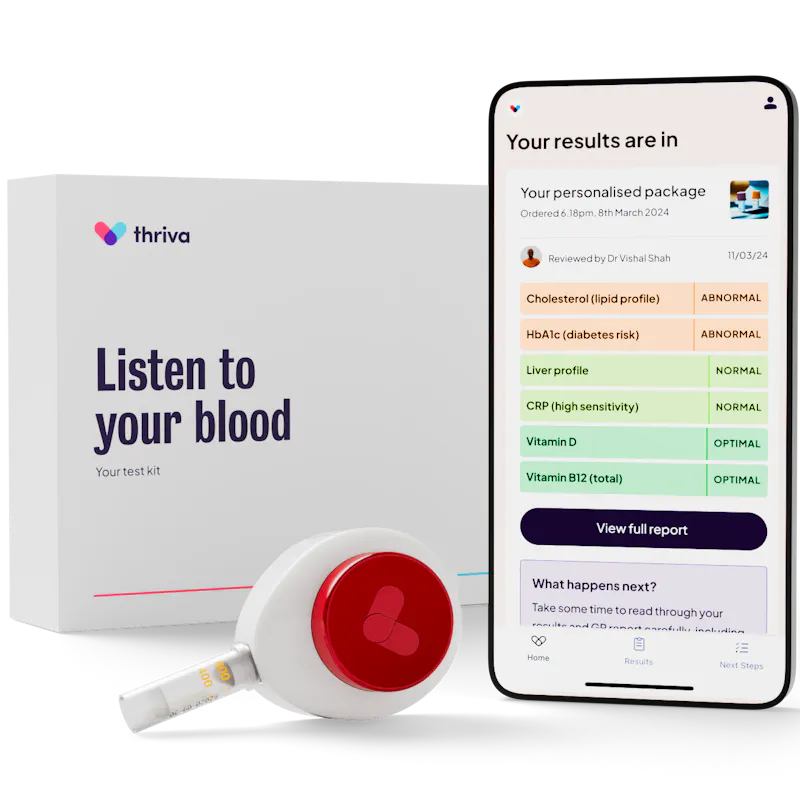10% off your first subscription blood test
10% off your first subscription blood test
- Home
- Health Hub
- Search
Search
Search results
221 results for ""
 research roundup3 minute read
research roundup3 minute readThe science of hugs: Why a 20-second embrace is the best Valentine's gift
Twenty seconds a day could completely transform how you feel. And no, you don't need to spend this time doing jumping jacks or braving icy water. You just need to give someone a hug. community health-insights6 minute read
community health-insights6 minute readDoes the time of day you take a blood test affect your results?
If you've ever done a blood test in the afternoon and received an unexpected result, the timing of your sample may be to blame. For a handful of biomarkers with strong diurnal variation, the time of day you take a blood test can meaningfully shift results. heart health2 minute read
heart health2 minute readWhy ApoB matters more than LDL cholesterol
If you're tracking your cholesterol, you might be missing an important number. While LDL has been the gold standard for decades, a growing body of research suggests ApoB is a more accurate predictor of cardiovascular disease risk. the method-podcast3 minute read
the method-podcast3 minute readWhy astronauts lose muscle faster and what it can teach us about ageing
"We usually say the six months in space are more or less like 10 years on Earth," explained Dr Filippo Ongaro, a physician who worked with the European Space Agency. The accelerated bone and muscle loss these astronauts experience provides unique insight into how we can stay strong as we age. the method-podcast1 minute read
the method-podcast1 minute readWelcome to The Method: Meet your hosts, Charlie & Greg
In today’s pilot episode, get to know your hosts, Dr. Greg Potter and Charlie Edmondson. research roundup4 minute read
research roundup4 minute readWhy exercise snacks matter even if you already work out
You’ve braved the 6 am alarm, put contacts into groggy eyes, pulled gym kit onto achy limbs. It’s a feat of willpower to accomplish your workout in time to shower, eat breakfast, and ‘officially’ start your day along with everyone else. the method-podcast2 minute read
the method-podcast2 minute readResistance training 101 with Dr Eric Helms
Dr Eric Helms explains the importance of strength training and how we can put the science into practice. the method-podcast3 minute read
the method-podcast3 minute readNew to resistance training, short on time, or hit a plateau? Try these tips
When it comes to feeling better now and protecting your long-term health, resistance training fits the bill. It strengthens bones, improves metabolic function, and builds the kind of physical resilience that pays dividends for decades. research roundup6 minute read
research roundup6 minute readWhat we can learn from America’s new food pyramid
The U.S. has just released its new food pyramid and dietary guidelines for Americans. And while it's garnered plenty of media attention so far, we wanted to dig into what the guidance actually says. Here’s our full breakdown of what it all means and what key takeaways you can apply to your own meals. the method-podcast4 minute read
the method-podcast4 minute readWhy your sleep needs are unique & practical tips for better rest
The standard advice says adults need seven to nine hours of sleep per night. While this isn’t explicitly wrong, it treats sleep like a one-size-fits-all prescription. In reality, sleep is more like a fingerprint; something uniquely shaped by your genetics, lifestyle, age, and more. the method-podcast2 minute read
the method-podcast2 minute readGetting better sleep with Dr. Sophie Bostock
In our first episode, we explore what really works when it comes to making the most of a night's sleep. community health-insights5 minute read
community health-insights5 minute readMy health journey 18 months on: What’s stuck, and what’s changed
Six months ago, we shared Dr Lucas Denton’s story: a year of health improvement that started with a single blood test. But health journeys don’t have a neat beginning, middle, and end. Even after reaching your goal, you transition into maintenance mode. the method-podcast1 minute read
the method-podcast1 minute readHave your say in The Method
The Method isn't just a place for expert opinions. We want your voices, too. community health-insights5 minute read
community health-insights5 minute readThe lifestyle changes Thriva users made when lowering their cholesterol
‘I lost [weight] just by the change in diet and exercise. I started these changes in July 2025, and I have got my cholesterol down.’ This Thriva user isn't alone. When we surveyed 45 people who'd successfully lowered their cholesterol, the majority reported making multiple changes in how they ate, moved, and lived. research roundup7 minute read
research roundup7 minute readWhy metabolic health is shaped by what you do consistently, not occasionally
December brings cold, sleepy mornings and long evenings. But it also means sharing meals with friends and family, and enjoying foods we don’t have every day. thriva for-partners2 minute read
thriva for-partners2 minute readCapillary blood sampling: A reliable method for at-home PSA testing
Capillary blood sampling has the potential to greatly expand access to healthcare. By facilitating diagnostic tests at home or at convenient, easily accessible locations, these methods have the capacity to improve detection rates and enable more effective disease monitoring. community health-insights5 minute read
community health-insights5 minute readThriva Year in Health Report 2024: How lifestyle changes influence biomarkers
At Thriva, we want to give our users as much insight into their health as possible - and we think community data is a powerful part of that. In 2024 we processed over 30,000 blood tests, and we're excited to showcase some key insights connecting the results to controllable lifestyle factors. wellness1 minute read
wellness1 minute readMetrics that matter: Single-leg stand
Testing this health metric only takes a few minutes, but it can give you significant insights into your current and long-term health. the method-podcast2 minute read
the method-podcast2 minute readMeet our hosts, Charlie and Greg
While Greg brings the scientific expertise, Charlie keeps things grounded in real life. the method-podcast1 minute read
the method-podcast1 minute readAbout The Method - Health in the Real World
There’s no shortage of health advice out there, but how much of it actually works? Cold plunges, glucose monitors, protein timing, strength training, avoiding microplastics… How do we figure out what’s worth our time? Now, there’s a method.